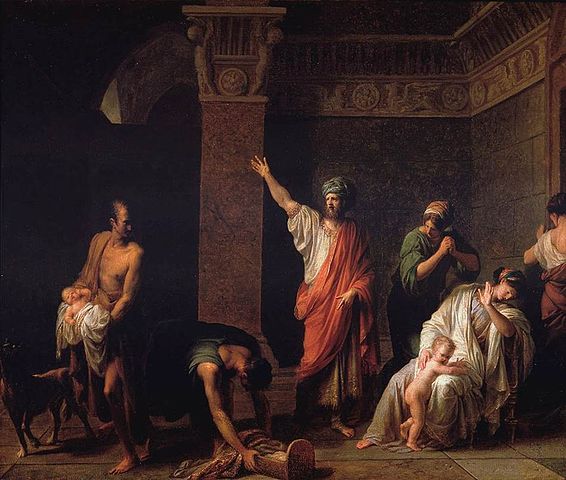Have you ever read Herodotus? Let me guess: the answer is no. Are you ever going to read Herodotus? You bet.
???
Well, bits of it, at any rate. 🙂 If I have anything to do with it.
Perhaps you think you have better things to do with your time and The Histories are too long and too boring. Well, of course, it’s too long. Nine books (some 700 pages) long; I’m not suggesting that you read it in one sitting. As for boring, Herodotus wrote 2500 years ago so you think he’s simply got to be boring: “Aw, he’ll go in for long descriptions!…” “His ideas are way behind the times.” “He’s tediously formal and never cracked a joke in his life…”
Well, I’ve got news for you. Herodotus is neither behind the times, nor boring (and even if he was, you’d be skipping the boring bits with me).

…few history books written since can compare for sheer drama with Herodotus’ narrative of the Persian invasions of Greece, and the Histories contains much more than that besides; all human life is there.
I started to share the best stories of Herodotus not because there was a huge popular demand for it (I’m yet to see the masses clamouring for more – of anything – on this blog) but because I don’t believe that Herodotus belongs to the academics only. People nowadays perceive classical authors as boring; in my experience it’s modern academics who are boring. Herodotus is anything but.
How could you not want to read Herodotus, the first historian, a man of inquisitive mind with the gift of the gab?
I am bound to tell what I am told, but not in every case believe it.
Herodotus, The Histories, VII. 152
How could you not want to read Herodotus, the author of unforgettable aphorisms and cracking stories? A genuine polymath (it was easier back then) who covers everything and anything from geography to folk customs…? The surprisingly modern thinker and a great champion of liberty and democracy? When you read him, it’s easy to see how much of our modern notions we truly owe to the ancient Greeks:
The rule of the majority, however, not only has the most beautiful and powerful name of all, equality [viz. equality before the law], but in practice, the majority does not act at all like a monarch… the majority chooses its magistrates by lot, it holds all of these officials accountable to an audit, and it refers all resolutions to the authority of the public.
Herodotus, The Histories, III. 80.
An awareness of history plays an important part in forming identity. Herodotus was the man who – while busy writing history – unwittingly created the identity of the West as we know it.
So that’s why you want to read Herodotus. With me. You can start right here:
Short Biography of a Boring Author
A Scribble on the Margin:
When I first wrote about Herodotus, I hadn't a clue of what I was doing (either with Herodotus or with my blog).
I hope I learned something since then:
The Best Stories of Herodotus is about to get zingy!
So watch this space... and spread the word.


I wish you well in your mission to overcome antipathy to that which is “old”, on principle. There are so many readable translations nowadays. Sometimes it is not the most readable works of an author which are thrust upon us. In my own case I struggled at university with Plato’s “Republic”‘ only to discover years later his “Laws” – a work of immediate relevance, and well and truly “taking the lid off” the traditional scholar’s approach to Greek civilization, democracy, etc. Des.
LikeLiked by 1 person
My theory is that academics deliberately make everything appear in a difficult light in order to reserve it for the ‘elite’ – ie. themselves. This keeps them in cushy academic jobs where they can moan about their students to their heart’s content while writing self-serving articles for academic journals only read by fellow academics. 🙂
Personally I think there are plenty of people out there who aspire to something a bit more in their free time than watching Big Brother… I suppose this is for them – Herodotus in digestible chunks. 🙂
LikeLiked by 1 person
So much truth about what you say about academics – “jobs for the boys”. Does creating a mystique extend equally to doctors, ministers of religion, plumbers, electricians —–? Des.
LikeLike
Doctors definitely, that’s why they use so many Latin and Greek words. 🙂 Although that doesn’t work as well in England as in Hungary because the common names of diseases in English are often the same; but in Hungarian pneumonia for example is only pneumonia in the doctor’s notes, the rest of the country has a nice long Hungarian name for it that they can actually understand the meaning of. 🙂
As for plumbers and electricians, etc.: they operate snobbery in reverse… 🙂 They don’t think anybody who sits in an office does honest work, let alone work that’s necessary and they feel quite superior to all the clueless intellectuals whose plumbing they fix! 🙂
LikeLike
Shared to Wyrdroad. Good work.
https://www.facebook.com/groups/513044925567142/
LikeLike
Reblogged this on Tome and Tomb.
LikeLike
Thank you (for both). I’m glad you liked it. I hope even more that you’ll like the bits of Herodotus that are coming too… I’d hate to disappoint after raising expectations. 🙂
LikeLiked by 1 person
Lol! Well, then, make it spectacular. And looking forward to it.
LikeLiked by 1 person
Easier said than done! But I’m trying. 🙂 Herodotus sure deserves it.
LikeLiked by 1 person
We translated Anabasis at school, because it was in the curriculum.
But what made you stumble on it? Mere chance? How can people who haven’t even heard of Herodotus find his works boring? Or are there any countries where children are forced to read H. in translation instead of translating themselves?
LikeLike
Where did you go to school that they made you translate Xenophon and Herodotus?!… I wish I went to the same school! Never mind Ancient Greek, not even Latin was on the curriculum any more in my time… So yes, we did read the Ancient Greek authors in translation; I really do think this would be the case in most countries nowadays (that is, where Ancient Greek authors are still part of the curriculum at all – my children weren’t exposed to a single one).
To be honest, I don’t recall reading Herodotus at all during my school days (excluding university here), although I’m sure he was mentioned to us. I very clearly remember reading Sophocles and Sappho in the first year of grammar school (age 14) and I still consider Antigone one of the best plays I’ve ever read – I’d love to see it acted at the amphitheatre at Epidauros but to make it really worthwhile I first need to improve on my ancient Greek – significantly! 🙂
LikeLiked by 1 person
Oh dear! Of course the Anabasis is by Xenophon – what was I thinking of. 😉 I attended a grammar-school for classical languages in Germany. I could have studied theology with this background, but I chose not too. My parents had to fight to have me accepted by the school, as the teachers considered girls unworthy of a classical education. There were other schools for feeble-minded females, but only this one for boys. Needless to say, I later sent my daughters to such a school in another city, but I don’t think they really appreciated it. You can’t please them all.
How do you go about improving your Ancient Greek? The pronunciation is so different from Modern Greek. Are there audio-files in Ancient Greek on the Internet? I never bothered to look, as I’m only concerned with modern languages these days.
LikeLike
I haven’t looked for audio files for Ancient Greek on the internet but I’ve got the recording that goes with the text book I’m using (or rather, I used as at the moment I shelved Ancient Greek – can’t keep up with learning two languages and blogging, plus family and working full-time, will have to take the languages one by one). I didn’t find the pronunciation as such particularly difficult in comparison to Modern Greek (except for the stress patterns but I struggle with those in any language).
But I did have some problems in Greece (I mean in addition to the fact that my Greek is not that good to begin with) because Ancient Greek writing was basically phonetic but since pronunciation changed in the past 2500 years Modern Greek isn’t always. So when I was talking to people in Greece, I kept straying into Ancient Greek pronunciation of words – something they found disconcerting – and when they were talking to me, I often had to mentally to spell the word I just heard before I was able to grasp the meaning.
But the truth is that as Ancient Greek is a dead language I don’t worry over much about the pronunciation beyond the basics – how likely is it that I’m ever going to converse with somebody in Ancient Greek after all? I just want to be able to read it fluently and without a dictionary. 🙂
LikeLiked by 1 person
Pingback: Essay – Histories – World Literature
Pingback: Virgil’s The Aeneid – World Literature